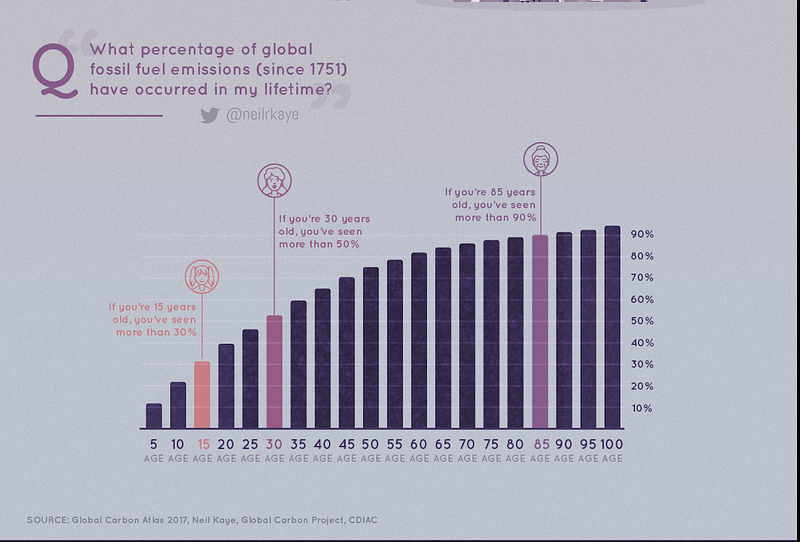Understanding Misconceptions Among Educated Individuals About Climate Change
Written on
Chapter 1: The Current Climate Reality
Climate science is incredibly robust; however, amid an urgent global crisis, we are met with ineffective agreements and governments' cozy relationships with fossil fuel companies. In the UK, substantial public funding for the oil and gas sector continues, even as the industry enjoys staggering profits while the planet suffers. This situation can easily lead to despair, making it seem as if the fossil fuel sector is unbeatable.
Few recognize that this industry's success stems from a long-standing tradition of politicizing climate issues, with corporate interests deeply embedded in governmental policies. The realm of environmental policy and public discourse was infiltrated by business interests long before the climate crisis intensified.
Many claims made by climate change skeptics are the result of a powerful public relations machine, initiated by pioneers like E. Bruce Harrison, the first environmental PR expert. Following in his footsteps, figures like Charles Koch have turned climate science into a political issue.
As we face this urgency, the countdown is on. We have less than six years to avert catastrophic outcomes, including a potential rise of 4 degrees Celsius.
What does a 4 degrees Celsius increase entail for humanity?
- Between 470 and 760 million individuals at risk
- Sea levels could rise by 9 meters
- Increased food insecurity and regressed development paths
- More frequent extreme droughts and flooding
- Half of all plant and animal species at risk of local extinction
- Collapse of marine ecosystems
- Complete loss of coral reefs at 2 degrees Celsius warming
This is the second installment in a series. If you haven’t read the first part yet, click here. Now, let’s address some prevalent claims made by climate change skeptics.
Section 1.1: Misunderstanding Climate Change
Skeptics often assert that while they acknowledge the concept of climate change, they believe that the human impact is not as severe as scientists claim. They argue that climate has always changed over geological time. However, historical climate variations serve as evidence of the climate's sensitivity to energy imbalance, with current CO2 levels being the primary contributor to this imbalance.

Just because past changes occurred naturally does not imply that present changes are not accelerating due to human activity.
Section 1.2: The Myth of Scientific Controversy
Despite the frustration climate deniers evoke, engaging with them often creates a misleading sense of controversy where none exists.
“The scientific consensus is clearly presented in the reports from the Intergovernmental Panel on Climate Change (IPCC). Established in 1988 by the World Meteorological Organization and the United Nations Environment Programme, the IPCC aims to assess climate science to inform policy decisions based on peer-reviewed literature. Their latest assessment unequivocally states that human activities are impacting Earth’s climate... Major scientific organizations in the U.S. have echoed these conclusions.” — Source
It is crucial to recognize that the fossil fuel sector has intentionally spread falsehoods to prolong the fossil fuel era. Non-renewable resources are, by definition, non-renewable.
Let’s examine the case of ExxonMobil.
In its efforts to mislead the public about global warming, ExxonMobil has executed one of the most sophisticated disinformation campaigns since the tobacco industry obscured scientific links between smoking and diseases such as lung cancer. Their tactics include:
- Creating doubt around indisputable scientific evidence
- Financing various front organizations to fabricate a broad platform for a small group of vocal climate change contrarians who misinterpret peer-reviewed findings
- Misrepresenting its opposition to action as a quest for “sound science” instead of self-interest
- Using its influence within the Bush administration to obstruct federal policies and shape government messaging on climate issues
There is no need for debate regarding the undeniable realities of the climate emergency. Allowing platforms for lukewarmers and deniers only serves the interests of fossil fuel companies, while meaningful actions are postponed.
The five-year window we have left is fleeting. Coordinated international action is essential. The U.S. has yet to declare a climate emergency, despite having labeled 79 other situations as emergencies, including “Blocking Property of Certain Persons Contributing to the Conflict in Côte d’Ivoire.”
If the climate crisis does not qualify as an emergency, what does?
Resources
- Explore the Harrison PR machine [here](#)
- Learn about the climate crisis [here](#)
- Take action against polluter payouts in the UK [here](#)
- Advocate for polluters to be held accountable in the USA [here](#)
- Track international climate action [here](#)
- Read about ExxonMobil's case [here](#)
Thank you for reading! For more insights like this, follow my account, and consider subscribing for early access to my articles.
An Injustice!
Discover a new intersectional publication focused on diverse voices, values, and identities at aninjusticemag.com